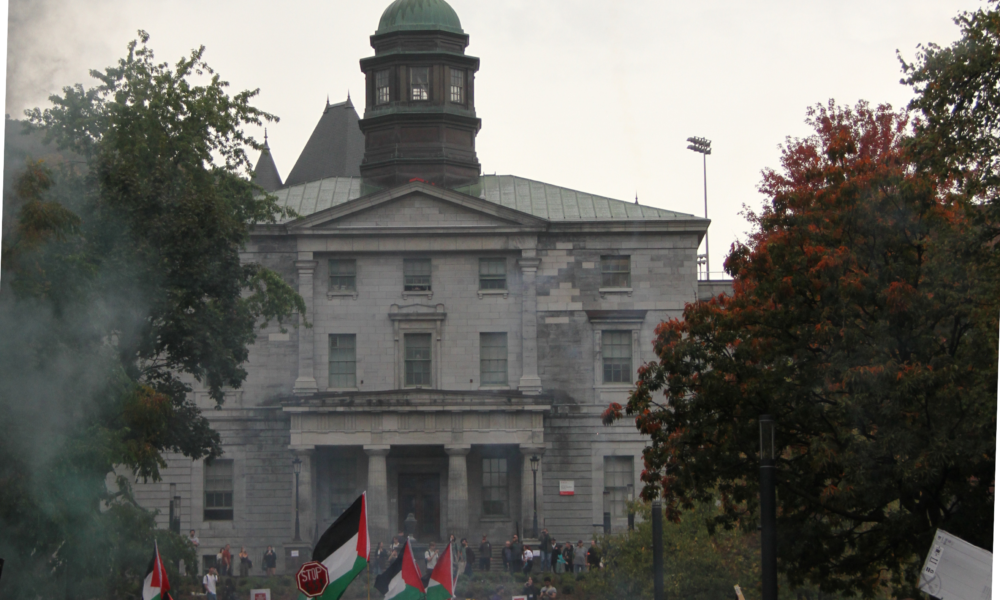On Oct. 10, 2025, the McGill Association of University Teachers (MAUT), which represents full-time professors and librarians, passed the Resolution to Endorse the Academic and Cultural Boycott of Israel—marking the first official collective action for Palestine taken by McGill faculty to date.
The motion, introduced by ten professors across multiple faculties, asserts that Israel’s actions in Gaza constitute genocide under the UN Genocide Convention, and that its system of governance over Palestinians amounts to apartheid. The motion cites reports from international organizations, including Amnesty International and Human Rights Watch, to argue that, by maintaining ties to Israeli universities that are deeply intertwined with the state’s military and political infrastructure, McGill is complicit in settler-colonial violence.
The resolution subsequently calls on McGill to recognize its role in perpetuating genocide, to divest from companies complicit in Israel’s occupation, and to sever academic partnerships with Israeli institutions. It also draws parallels between its current demands and MAUT’s prior discussions about divesting from Russian companies after Russia’s invasion of Ukraine, and McGill’s divestment from South Africa during apartheid.
McGill’s Media Relations Office declined to comment on the resolution’s content or passing.
In an interview with The Tribune, Daniel Schwartz, associate professor in the Languages, Literatures, and Cultures department at McGill, noted that some faculty were concerned that the motion could infringe on academic freedom. He explained that the boycott proposed by MAUT does not target individual Israeli academics, and argued that critics’ appeals to academic freedom are misguided given the conditions faced by Palestinian scholars.
“We’re not trying to boycott or silence any of our Israeli colleagues. [….] This is really about institutional relationships,” Schwartz said. “The idea of invoking values like academic freedom and discussion is […] a little bit in bad faith, because you can’t have a real dialogue with somebody who is buried under rubble and doesn’t have any universities.”
The vote needed to meet a quorum of 100 professors to be binding, with a simple majority in favour allowing the motion to pass. Of the 150 members who registered for the SGM, 114 attended. Professors noted that some faculty members walked out of the meeting in an apparent attempt to reduce attendance and break quorum. However, the meeting maintained quorum throughout, and the resolution ultimately passed with 104 in favour, eight opposed, and two abstaining.
In an interview with The Tribune, Alia Al-Saji, professor of the Department of Philosophy, described her surprise at the motion’s passing, noting that the nature of this SGM is unprecedented.
“I’ve been at McGill for 23 years, and I’ve been in MAUT for 23 years, and I did not even expect us to be able to have a meeting on this,” she said. “So just having the meeting was kind of incredible.”
The resolution includes a two-year sunset clause, meaning it will require renewal through a future vote. In an interview with The Tribune, Rula Abisaab, professor of the Institute of Islamic Studies and one of the presenters of the resolution, reflected on her initial reaction to the motion’s passing, while emphasizing that continued oversight from MAUT will be necessary to ensure McGill works toward meeting the outlined calls to action.
“We [are] euphoric, we are very, very, happy, but I think now the work starts,” Abisaab said. “We feel the responsibility of actually […] making sure that it is observed in the […] different faculties. [….] So we have to be diligent. We have to be aware.”
Al-Saji highlighted the resolution’s broader significance for academic freedom at McGill and beyond, noting that Israeli academic institutions have demonstrated a pattern of censoring criticism of Israel among their students and faculty, and preventing Palestinians from accessing an education equivalent to Israelis’. As of May 2025, the UN reported that Israel’s assault on Gaza destroyed all universities, killing at least 5,479 students and over 190 university staff.
Specifically, Al-Saji mentioned Nadera Shalhoub-Kevorkian, who was suspended from Hebrew University and arrested by Israeli police for criticizing Zionism on a podcast.
“There isn’t academic freedom for Palestinian students in Israeli universities, there isn’t academic freedom for actually, anyone who wants to criticize the genocide,” she emphasized. ”We’ve seen academics be suspended for speaking out against Zionism. It’s our duty, if we actually do believe in academic freedom deeply, to have this voice.”
Earlier this month, over 500 McGill students voted to hold a one-day strike on Oct. 7, calling on the university to divest from companies supplying Israel with weapons, and to drop disciplinary cases against pro-Palestinian activists. Mayada Elsabbagh, professor in the Department of Neurology and Neurosurgery, reflected on the significance of recent student activism at McGill and shared what she hopes students will take away from this motion.
“I know a lot of students in the activist movement who’ve been incredibly brave, not just in the last two years, but for many, many years, [and] have been disappointed, skeptical, frustrated with the position of faculty members,” Alsabbagh said. “I hope that, in some small symbolic way, today’s vote reassures the students of what we all know, [which is] that students always stand on the right side of history.”







